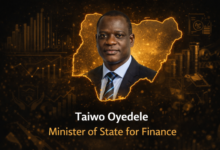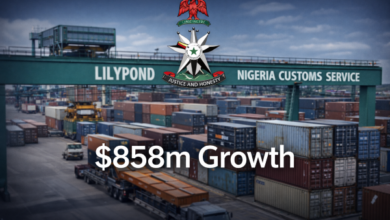NCC: A Legacy of Vision, Strategic Collaborations And Partnerships
 The Nigerian Communications Commission (NCC) ably led by the Executive Vice Chairman and Chief Executive Officer of the Commission, Professor Umar Garba Dangote on assumption of office in 2015, introduced various reforms and initiatives to drive his seven-point agenda for the Nigerian telecommunications industry.
The Nigerian Communications Commission (NCC) ably led by the Executive Vice Chairman and Chief Executive Officer of the Commission, Professor Umar Garba Dangote on assumption of office in 2015, introduced various reforms and initiatives to drive his seven-point agenda for the Nigerian telecommunications industry.
Among these was the launch of the Commission’s Strategic Vision Plan (SVP) 2021-2025 to drive the attainment of its mandate and develop the communications sector in line with the expectations of the Nigerian Communications Act (NCA) 2003.
The Strategic Vision Plan 2015-2020 which expired in December 2020 was replaced by the Strategic Vision Plan 2021-2025. The SVP 2021-2025 has five pillars.
Among the five pillars are: Organisational renewal for operations efficiency and regulatory excellence; Facilitate the provision of infrastructure for a digital economy which fosters national development; Improve Quality of Service (QoS) for enhanced Consumer Quality of Experience (QoE); Promote fair competition, inclusive growth, increased investment and innovative services; and Facilitate Strategic Collaboration and Partnership.
Under the guidance of Prof Danbatta, the Commission also introduced the Strategic Management Plan (SMP) for fiscal years 2020-2024, the third of such since the deregulation of the Nigerian telecom industry in 2001. The SMP 2020-2024 is designed to bring the benefits of the digitized economy to the citizens of Nigeria.
Christened ASPIRE 2024, Prof Danbatta while unveiling the Commission’s SMP 2020 – 2024 said it comprises five pillars, viz: Regulatory Excellence- to develop adaptive and sustainable regulation to ensure efficient regulatory service to all stakeholders; Universal Broadband Access- to achieving pervasive and inclusive broadband access by providing incentives for broadband deployment in Nigeria.
The rest are of the pillars are; Promote Development of Digital Economy- provide the necessary regulations and initiatives for the achievement of the Digital Economy policy thrust of the Government; Market Development- ensure a dynamic market that drives innovation necessary for economic growth; and Strategic Partnering: aims at mutually sustainable collaboration with relevant stakeholders.
According to the EVC/CEO of the NCC, the SVP 2021-2025 and SMP 2020-2025 took into consideration, the provisions of the National Digital Economy Policy and Strategy 2020-2030, and National Broadband Plan 2020-2025.A look at the Fifth Vision of the SVP 2021-2025, Facilitate Strategic Collaboration and Partnership, shows that much progress has been made in meeting the milestone.
Inter-agency Partnerships
Under the Strategic Collaborations and Partnerships Vision of the SVP 2021-2025, the Commission has partnered with law enforcement agencies such as the Police, Nigeria Security and Civil Defence Corps (NSCDC) address cases of telecoms infrastructure vandalism.
It has partnered with the Economic and Financial Crimes Commission (EFCC) and the Independent Corrupt Practices and Other Related Offences Commission (ICPC) to nip crime and fraudulent activities in the sector.
Also, the Commission and the Federal Inland Revenue Service (FIRS) set up a Joint Committee of senior and management staff of the two agencies towards the implementation of inter-agency strategies for enhancing national revenues in the telecommunications sector.
The Commission signed a revised Memorandum of Understanding with the National Lottery Regulatory Commission, NLRC, with provisions to deter unapproved lottery and gaming practices on telecommunications platforms through information and intelligence sharing.
Executive Vice Chairman of NCC, Prof. Umar Danbatta noted that the MoU, which will impact the gaming industry, is in sync with the Commission’s Strategic Vision Plan (SVP) and is in a bid to promote fair practices in the industry for the protection of telecommunications consumers in relation to lottery and gaming activities.
He said the collaboration is in line with the provisions of Commission’s SVP, 2021-2025, which provides for facilitation of strategic partnership and collaboration with other bodies to enhance service delivery. „The initial MoU expired in 2022, amendments and modifications have been made since no MoU is cast in stone, especially given the industry‘s dynamic nature,” he said.
Private Sector Collaborations
It also signed a Public Private Partnership (PPP) agreement with its consultants, 3R Company Nigeria Limited, for the execution of the Revenue Assurance Solutions (RAS) to strengthen and manage the integrity of revenue generation process in the Nigerian telecommunications industry.
The deployment of RAS would enhance monitoring and regulatory activities concerning Annual Operating Levy (AOL) administration in the telecommunications industry and to confer higher levels of integrity and fidelity on the AOL figures obtainable in the industry.
Under Danbatta, NCC has extended its hand of fellowship to organisations such as the Council for the Regulation of Engineering in Nigeria (COREN), the Nigerian Society of Engineers (NSE), the Renewable and Alternative Energy Society (RAES), and the Nigerian Institute of Electrical and Electronics Engineers (NIEEE), the Nigerian Institute of Public Relations (NIPR) and the Lagos Lawn Tennis Club.
Partnerships for Digital Inclusion
The Commission had facilitated strategic partnerships with the Central Bank of Nigeria (CBN), the Fintech Association of Nigeria (FintechNGR), the International Telecommunications Union (ITU), the West Africa Telecommunications Regulators Assembly (WATRA), Rockefeller Partnership Agreement (RPA), and other government agencies, to promote Digital Financial Services (DFS) and Digital Financial Inclusion (DFI) in Nigeria.
NCC also facilitated the signing of a bilateral agreement between Nigeria and Republic of Niger in Abuja for coordination of frequency utilisation along their borders to ensure seamless deployment of services around within the two countries.
International Collaborations
The agreement signing ceremony was one of the highlights of the two-day Digital Economy Regional Conference, hosted by the Nigerian government and facilitated by the Federal Ministry of Communications and Digital Economy, which ended at the Transcorp Hilton Abuja.
Nigeria’s Minister of Communications and Digital Economy, Prof. Isa Ali Ibrahim Pantami, signed on behalf of Nigeria, while his Nigerien counterpart, the Minister of Post and New Information Technologies, Mr. Moussa Baraze, signed on behalf of his country.
The Executive Vice Chairman and Chief Executive Officer (EVC/CEO) of the Nigerian Communications Commission (NCC), Prof. Umar Danbatta and Niger Republic’s Chairperson of the National Council for Regulation of Electronic Communications and Post, Mrs. Aichatou Oumani, were witnesses to the agreement, which applies to the co-ordination of frequencies existing in the Nigeria-Niger transboundary areas between 87.5 megahertz (MHz) to 30 gigahertz (GHz).
The agreement indicated it will help in effective coordination and sharing of frequencies and channels in the ‘buffer zone or area’ on borderlines between the two countries and also help to address one of the major issues of signal interference regulation that may arise in telecoms signal transmissions by terrestrial telecoms service providers, as it spells out the procedures for regulating such cases.
The agreement, according to the two parties, provides, in part, that in case of harmful interference affecting one of the parties, the affected party shall inform the other party in writing for necessary action to be carried out.
Leadership










